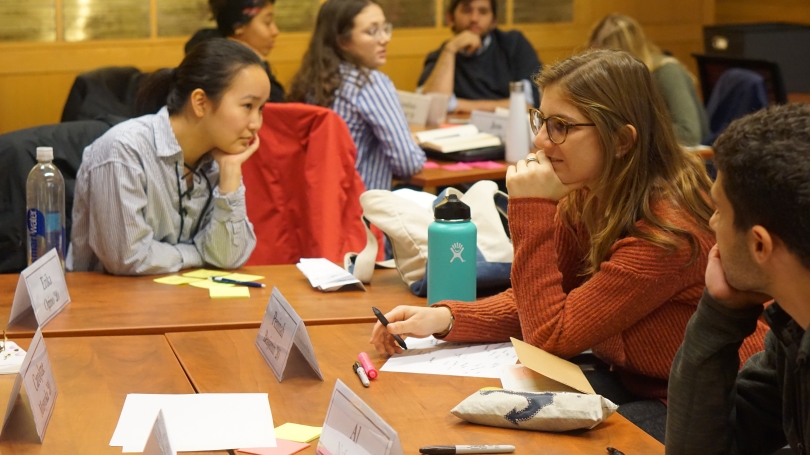
- Public Policy
- Leadership
- Funding
- News & Events
- About the Center
Back to Top Nav
Back to Top Nav
Back to Top Nav
Back to Top Nav
How does one translate personal stories from a place of “we’re mad” into a force for lasting change? On November 14, Shasti Conrad helped answer this question in an evening session with the Rockefeller Leadership Fellows on “Activism and Institutional Change: Tools for People-Powered Policymaking”. Shasti Conrad holds positions as Chair of the King County Democrats, and most recently as U.S. campaign manager for the 100 Million Campaign. She has worked with three Nobel Peace Prize winners, including President Obama, Malala Yousafzai, and Kailash Satyarthi. As of October, Shasti left the foundation and is now working with the Democratic presidential campaigns to connect artists, actors, and musicians to their campaigns.
Shasti kicked off the session by telling her own story of where her activism began at Seattle University, where she spearheaded a campaign to serve only fair-trade coffee across campus dining. It was at this time that she began to understand the power that storytelling possessed in bringing people together to make lasting structural changes. She introduced a diagram called the Marshall Ganz Public Narrative, which depicts the three major components of compelling storytelling, deconstructed into the “Story of Self”, the “Story of Now”, and the “Story of Us”. Each of these components connects to the next, respectively, through a sense of purpose, urgency, and community. Using a more personal example, when Shasti said “I cannot wait 4 to 8 years for Medicare For All. My mom is sick, we don't have time to wait!”, she was invoking a sense of urgency and purpose by connecting her story of self with the story of now. After reviewing a compelling congressional testimony urging for passage of the Affordable Care Act from an 11-year-old, Marcelas Owens, whose mother passed away without healthcare access, Shasti turned to the Fellows to deconstruct how Marcelas’ testimony utilized the Marshall Ganz Public Narrative and to reflect on ways in which public narratives have shifted public discourse and opinion in current events.
Shasti then divided the Fellows into small groups to engage in a role play exercise, each consisting of an owner of a small-scale dispensary, a marijuana policy researcher, a law enforcement officer, and a concerned constituent. The objective of each group was to brainstorm and then select which stakeholder would be best positioned to advise State Senator Martha Hennessy (NH-05) on whether or not to support cannabis legalization in New Hampshire. Using the Marshall Ganz public narrative and published materials from assigned readings, each group crafted their most compelling story for their selected stakeholder to convince State Senator Martha Hennessy to take on their desired outcome.
Shasti wrapped up the session by leaving the Fellows with a few insights on activism. She reminded the Fellows that “you are not a voice for the voiceless, but just the ones holding the microphones. It is about who has access to the microphone". Additionally, Shasti urged us to get engaged in public discourse and politics because “If you’re not at the table, you are on the menu”. Finally, she underscored that sustainable work requires self-care. The session ended with an open forum for the Fellows to ask Shasti about her advice or any set of questions on activism.
-Written by Nick Woo, Class of 2020 Rockefeller Leadership Fellow
As Rockefeller Leadership Fellows, seniors gain a better understanding of the qualities and responsibilities expected of leaders. As Fellows take part in the workshops, dinner discussions, and team-building exercises, they examine their skills, qualities, and attributes as leaders and analyze how these influence teamwork and achieving goals.